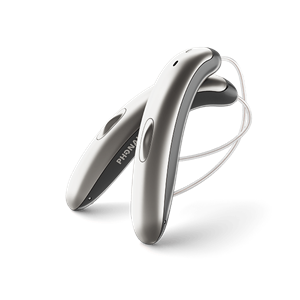Am I losing my hearing? Recognizing the signs of early hearing loss

Am I losing my hearing? Recognizing the signs of early hearing loss
5 min.
Publication Date: June 5, 2025
Hearing is one of our most valuable senses, connecting us with the world around us through conversations, music, and everyday sounds. However, hearing loss often begins subtly, gradually impacting our daily lives without us even noticing. Understanding the early signs of hearing loss can help you take proactive steps to protect and preserve your hearing.
What is hearing loss?
Hearing loss refers to a decreased ability to hear sounds clearly, ranging from mild difficulty in conversations to more severe hearing impairment or deafness. It can occur suddenly, though it usually develops gradually, making it difficult to detect at first.
Hearing loss can affect anyone regardless of age, but it’s particularly common among older adults. Identifying hearing loss early not only helps maintain your independence and communication but also significantly enhances your overall quality of life, helping you stay actively engaged with family, friends, and the activities you enjoy.
Common early signs of hearing loss
Early signs of hearing loss can be subtle and easily overlooked, especially if attributed to fatigue or distractions. However, recognizing hearing loss symptoms early can help you take action before your hearing worsens, impacting your relationships and everyday enjoyment:
Difficulty understanding conversations: Especially in noisy places like restaurants or social gatherings.
Frequently asking people to repeat themselves: Often needing others to speak louder or clearer.
Muffled speech perception: Sounds or voices seem muffled or unclear.
Increasing volume levels: Often turning up the volume on your television, phone, or radio.
Trouble with high-pitched sounds: Difficulty hearing children’s voices, birds singing, or phone rings.
Experiencing tinnitus: Hearing persistent ringing, buzzing, or whooshing sounds in your ears.
Social withdrawal: Avoiding conversations or social activities because it feels exhausting or embarrassing.
Fatigue after conversations: Feeling unusually tired after long conversations or meetings.
Causes of hearing loss
Hearing loss can result from various factors. Age-related hearing loss (presbycusis) is common as we grow older, naturally affecting our ability to hear clearly, especially high-frequency sounds.
Regular exposure to loud noises, such as concerts, machinery, or loud workplaces without ear protection, can also damage your hearing over time.
Certain medical conditions, including chronic ear infections, can impact hearing. Persistent infections or inflammation may cause lasting damage to your ears.
Genetics can also play a role; if hearing loss runs in your family, you might be at higher risk. Additionally, some medications, particularly antibiotics or chemotherapy drugs, can affect hearing. Always discuss potential side effects with your healthcare provider.
When to arrange a hearing test
Recognizing hearing issues early significantly improves the effectiveness of treatment options. If you notice any early signs of hearing loss, scheduling a hearing evaluation with an audiologist or Hearing Care Professional (HCP) is an important first step. Our HCPs are experts who can assess your hearing and recommend personalized solutions.
Regular hearing check-ups are especially beneficial for adults over 65, those frequently exposed to loud noises, or individuals with a family history of hearing loss.
Simple ways to protect your hearing
Taking care of your hearing doesn’t have to be complicated. Incorporating simple, everyday habits can significantly reduce your risk of hearing loss or slow its progression, ensuring you continue enjoying your favorite activities without worry. Consider wearing earplugs or earmuffs in noisy environments, keeping volumes moderate on personal audio devices, and scheduling regular hearing tests. Maintaining a healthy lifestyle through regular exercise and a balanced diet, as well as discussing potential medication side effects with your healthcare provider, can further support better hearing.
Treatment options
Today, there are more effective ways than ever to manage hearing loss. Knowing your options can help you confidently choose solutions that improve your quality of life:
Hearing aids
Modern hearing aids are discreet and powerful, helping you hear clearly and comfortably. You can learn more about different types and styles of hearing aids on our hearing aids page.
Assisting listening devices
Tools like amplified phones, specialized headphones, and personal amplifiers enhance hearing in specific situations, making conversations easier to follow.
Communication strategies
Practical strategies, such as facing speakers directly, reducing background noise, and using visual cues, can significantly enhance your ability to follow conversations.
Take the next step for your hearing
Recognizing the early signs of hearing loss is key to protecting your hearing and maintaining your quality of life. If you or a loved one experiences any signs of hearing difficulties, don’t delay seeking professional help.
At Connect Hearing, our HCPs are dedicated to providing compassionate care and effective solutions to keep you connected to the people and sounds you love. To discuss your hearing concerns or schedule a hearing evaluation, contact us today.
Take charge of your hearing health—your future self will thank you!
The information contained in this article is for educational and informational purposes only. You should not use the information as a substitute for, nor should it replace, professional medical advice. If you have any questions about your health, you should always consult with a physician or other health-care professional.



